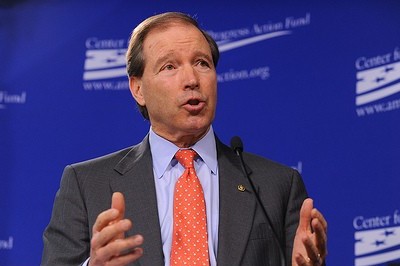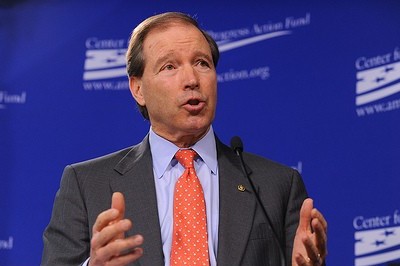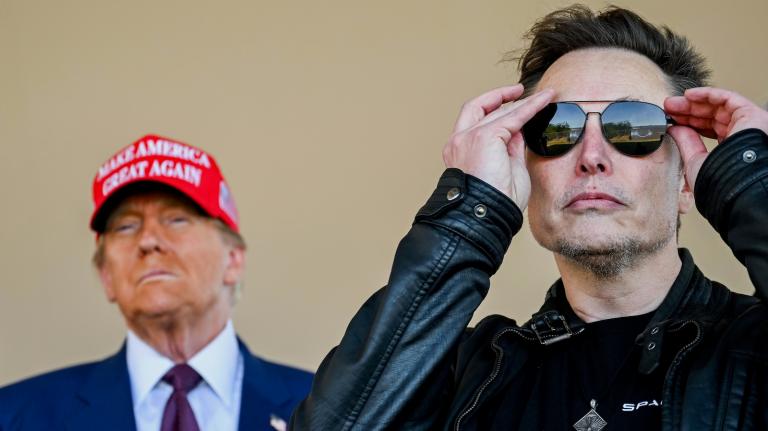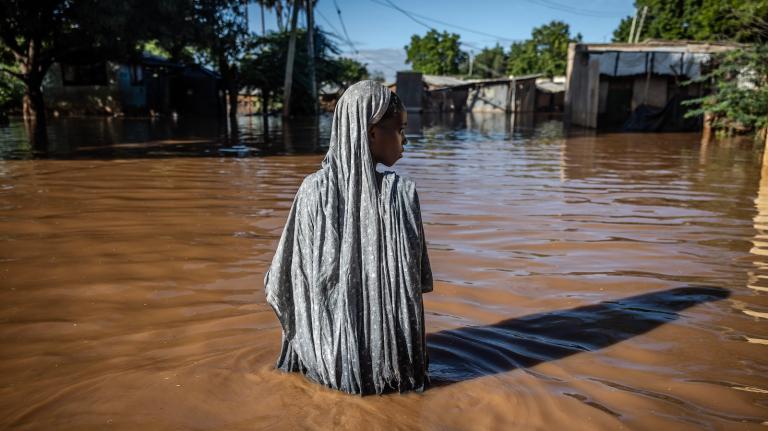 Sen. Tom UdallPhoto: Center for American Progress Action FundLike his cousin Mark, Sen. Tom Udall (D-N.M.) spent 10 years in the House of Representatives before being elected to the Senate in 2008. Like his legendary father Stewart (the former interior secretary who passed away last week), he has always had a keen interest in the environment. His first speech and bill in the Senate proposed a tough renewable electricity standard, and he’s pushing hard for comprehensive climate legislation.
Sen. Tom UdallPhoto: Center for American Progress Action FundLike his cousin Mark, Sen. Tom Udall (D-N.M.) spent 10 years in the House of Representatives before being elected to the Senate in 2008. Like his legendary father Stewart (the former interior secretary who passed away last week), he has always had a keen interest in the environment. His first speech and bill in the Senate proposed a tough renewable electricity standard, and he’s pushing hard for comprehensive climate legislation.
I caught up with Udall this week to talk about the fate of climate and energy legislation, his efforts to strengthen the Senate’s renewable standard, and the growing momentum behind reforming the filibuster.
——
Q. You sent Senate Majority Leader Harry Reid [D-Nev.] a letter last Friday, cosigned by 21 of your fellow Democrats, asking him to bring a comprehensive climate and energy bill to the floor this year. Was that pushback against the effort by Sens. Jeff Bingaman [D-N.M.], Byron Dorgan [D-N.D.], and others to back an “energy-only” bill?
A. Discussion in our caucus has focused around two alternatives: one would be an energy-only bill and one would be energy bill with a climate change component. Sen. Reid’s making this decision. He needs to decide whether he has the votes to bring a particular proposal up and move it along. So this was a helpful way for him to know who was weighing in on the side of the combined energy and climate approach.
Q. What’s your sense of the balance of opinion in the Democratic caucus right now?
A. I think there’s even more support for a comprehensive approach than what’s in the letter. When you do these things, sometimes you can’t quite capture the language that you need in the letter to get a broader group [of signatories]. I sense there’s very strong support in the caucus for a stronger approach.
We must put a price on carbon. That’s what’s going to drive the clean energy economy. We’re going to have to do it at some point, in some form, and I believe doing it sooner rather than later is the way to go. It will give the clearest possible signal to industry, consumers, and everyone else as to the direction we want to move. I would just remind people that China is already moving aggressively on a clean-energy economy in the manufacturing area.
Q. Obviously the question for Sen. Reid is whether he can pull together 60 votes for a bill that includes a carbon pricing system. After health-care reform passed, Sen. McCain said, flatly, “There will be no cooperation for the rest of the year.” Do you think it’s going to be possible to get the four or five Republican votes necessary?
A. The [Kerry-Graham-Lieberman] process is trying to build that support. At this particular point, we may be up to four or five. I think we can do some things to broaden out — my goal would be to get 10 Republicans on the bill.
Q. That would be quite something. Are there details about the KGL bill that you’d like to share?
A. We’re not ready to put it in detailed form right now. We first need to develop the narrative, then get down to the specific concepts, and then get into the details. I’m not suggesting this should be a year-long process — we need to do all of this in the next couple of weeks, and then give Sen. Reid a sense of where we are. He’ll work with Sen. [Dick] Durbin [D-Ill.] to find out how much support this has.
Q. Are financial regulation and immigration both ahead in line?
A. Sen. Reid has not given us a priority at this point. I hope we can get things together to do a comprehensive energy package right after health care. The reason for that is jobs. It’s what the American people want us to focus on. The clean-energy economy is where we need to be, and many states are leading now. If we had a national policy, it would really move us in the right direction.
Q. The first bill you introduced as a U.S. senator was a renewable electricity standard with a 25 percent by 2025 target. The RES that passed the Senate Energy Committee as part of the American Clean Energy Leadership Act is much more modest, 15 percent through 2030, with several loopholes. Are you working to try to bulk up support for a stronger RES?
A. Yes, I am. Our bill is the strongest one in the Senate and focuses strictly on renewable energy: wind, solar, biomass, geothermal. Right now we have 10 cosponsors and we’re continuing to push for more.
Q. What’s your sense of why the Energy Committee’s RES is so modest?
A. You have to look at the makeup of the Senate Energy Committee — it’s a very moderate committee. As we move to the floor, I think we’re going to see growing support for making the RES stronger, moving it closer to 25 percent by 2025.
If we do have an energy-only bill — and I’m not saying that’s where I want to be — I still think there’s going to be a push to strengthen the RES. Sen. Bingaman is the father of the RES in the Senate and a champion on this issue. It’s not as strong as either I or Sen. Bingaman would like, but it’s a significant achievement to move it through committee with the support of Sen. [Sam] Brownback [R-Kan.]. Without Sen. Brownback’s vote, it wouldn’t have passed the committee. So Sen. Bingaman was focusing on how to get a bill out of committee, and he did that narrowly.
Q. One thing that vexes the politics of the RES is that some states, particularly in the Southeast, don’t think they have access to enough renewables to hit the targets. They think they’ll end up subsidizing the Midwest states with wind and the Western states with sun. How do you bring them around on this?
A. We faced this when we got the bill through the House of Representatives. We had some support in the South when they understood that they have significant biomass resources in their forests. What we’re really doing with an RES is creating a national market. In some areas the market may be a little more advanced in solar, or a little more advanced in wind. But by creating a national market, we’re going to move all areas of renewable energy along. What I would tell my friends in the South is: all the third-party studies have shown that you can achieve the goals in the bill, and this is something that can be accomplished without too much pain.
Q. As you know, there’s a push in the Senate to broaden the RES so that it includes nuclear and coal with carbon sequestration. Is that something you plan to fight? Or do you think it’s a reasonable compromise to gather some votes?
A. I would prefer, at this point, to leave the RES clean, the way it’s passed the House and the Senate before, and try to work on a separate nuclear title. Nuclear’s in a different category. It’s a mature industry; it’s had subsidies in the past. Last time I looked, it was in the range of $36 billion in subsidies, and there may be many more on top of that. So, if we’re trying to get an additional generation of nuclear plants, the way to do that is to address the issues within the industry rather than trying to do it through the RES.
Q. You were on the peak oil caucus in the House.
A. I started it. I saw Roscoe Bartlett [R-Md.] one evening on the floor talking about peak oil and I went up to him and said, “I’m interested in this too. This is something that people need to understand here in Congress. If you and I teamed up, we’d have a Democrat and a Republican. Why don’t we start a peak oil caucus?” That’s what we did. I worked hard on educating my colleagues after we got it started and I’m going to continue to do that here in the Senate.
Q. Given your awareness and understanding of that issue, how do you feel about the push to expand offshore and domestic drilling as part of the energy bill?
A. One of the things that we have been doing, which I think is significant, is increasing our recovery of our oil and natural gas resources. We’ve been good at technological developments on that front. We need to continue to do that. I think there are going to be areas where we can work with the states and develop additional offshore resources.
I don’t think the Interior Department is prepared at this point to open everything [to oil drilling]. We should do it in a methodical way, pick the areas that are ripe, and get them done. We should be a good steward of these resources and make sure that they’re developed properly.
Q. Harry Reid recently signaled some openness toward filibuster reform, which was a fringe idea not very long ago.
A. We’re gaining momentum on this one.
Q. How much momentum? What are the chances that, per your reform idea, Congress will vote at the beginning of the 2011 session to establish new rules for the Senate?
A. I wouldn’t predict. I will tell you that momentum is growing every day. If the Republicans continue their tactics, momentum will increase. That’s part of the reason Sen. Reid announced to them that he was going to look at filibuster reform and other rule reforms in January.
It’s not just the rules; it’s how you use the rules. And it’s clear that the Republicans have abused the rules. In the last Congress there were 112 filibusters, more than in the 1950s and ‘60s [combined]. That shows how far it’s gone over the line.
Q. Will the rules around holds be part of reform? [Editor’s note: Currently, individual senators can place anonymous holds on legislation or nominations, effectively grinding the Senate to a halt. See: Sen. Jim Bunning.]
A. That should be part of it. Holds aren’t even in the standing rules of the Senate, except in the sense that it’s the threat of a filibuster. We have to make them transparent. I’m working with a group of senators on it, including Ron Wyden [D-Ore.].
Read more interviews with members of Congress:
- Rep. Brian Baird (D-Wash.)
- Rep. Tom Perriello (D-Va.)
- Sen. Mark Udall (D-Colo.)
- Sen. Bernie Sanders (I-Vt.)



